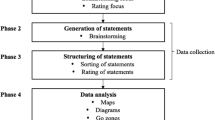Abstract
The European Union has been encouraging a move towards gender equality since its 6th framework programme. In its 8th programme, H2020, the EU points scientists to documentation outlining the concepts of sex/gender, inviting those applying for funding to state how and why their research will impact gender and how the project will foster gender equality.
However, it is often difficult for scientists from the science, technology, engineering and mathematics sectors who have not received training on gender issues to include a gendered approach in research. Even when this does occur, it is often limited to ensuring an equal number of men and women in project activities.
The Systemic Action for Gender Equality (SAGE) project produced an online course suited to the research funding application path. The course targets academics and professionals seeking to advance gender equality in the workplace. It enables them to understand the basic principles and biases favouring gender imbalance in research organisations and learn to use methods and strategies to progress toward a gender-sensitive organisation and research path.
Supported by adult learning theory and social constructivism, this case study explores how gender-sensitive methods and strategies can be applied to developing and implementing an online education path. It also discusses the limits and opportunities and the theoretical and practical implications of the move towards gender-sensitive research.
Access this chapter
Tax calculation will be finalised at checkout
Purchases are for personal use only
Similar content being viewed by others
References
Bray, F.: Gender and technology. Annu. Rev. Anthropol. 36(1), 37–53 (2007)
Harding, S.: The Science Question in Feminism. Cornell University Press, Ithaca (1986)
Merchant, C.: The Death of Nature: Women, Ecology, and the Scientific Revolution. Harper & Row, New York (1980)
Wajcman, J.: Feminism Confronts Technology. Polity Press, Cambridge (1991)
Wajcman, J.: Reflections on gender and technology studies: in what state is the art? Soc. Stud. Sci. 30(3), 447–464 (2000)
Haraway, D.: Manifesto for cyborgs: science, technology, and socialist feminism in the 1980’s. Aust. Feminist Stud. 2(4), 1–42 (1987)
Haraway, D.: A cyborg manifesto: science, technology, and socialist feministm in the late twentieth century. In: Haraway, D. (ed.) Simian, Cyborgs, and Women - The Reinvention of Nature, pp. 149–181. Routledge, New York (1991)
Lohan, M., Faulkner, W.: Masculinities and technologies: some introductory remarks. Men Masc. 6(4), 319–329 (2004)
Eurostat Office: Girls and women under-represented in ICT (2018). https://ec.europa.eu/eurostat/web/products-eurostat-news/-/EDN-20180425-1. Accessed 02 Mar 2020
European Commission. She Figures 2018. Report (Publications Office of the European Union (2019). https://doi.org/10.2777/936
Gorbacheva, E., Beekhuyzen, J., vom Brocke, J., Becker, J.: Directions for research on gender imbalance in the IT profession. Eur. J. Inf. Syst. 28(1), 43–67 (2019)
Nielsen, M.W., Bloch, C.W., Schiebinger, L.: Making gender diversity work for scientific discovery and innovation. Nat. Hum. Behav. 2, 1–9 (2018)
Knowles, M.S.: The Modern Practice of Adult Education: From Pedagogy to Andragogy, 2nd edn. Cambridge Books, New York (1980)
European Commission: Making a European area of lifelong learning a reality. Communication from the Commission. COM (2001) 678 final, 21 November 2001
Jarvis, P.: Teaching, Learning and Education in Late Modernity. Routledge, New York (2012)
Atkinson, P.: Creating Culture Change Strategies for Success. Leighton Buzzard, Bedfordshire (1997)
Kanter, R.M.: Men and Women of the Corporation. Basic Books, New York (1993)
Kotter, J.: Leading Change. Harvard Business Review Press, Cambridge (2012)
Gaucher, D., Friesen, J., Kay, A.C.: Evidence that gendered wording in job advertisements exists and sustains gender inequality. J. Pers. Soc. Psychol. 101(1), 109–128 (2011)
Moss-Racusin, C.A., Dovidio, J.F., Brescoll, V.L., Graham, M.J., Handelsman, J.: Science faculty’s subtle gender biases favor male students. Proc. Natl. Acad. Sci. U. S. A. 109(41), 16474–16479 (2012)
Verge, T., Ferrer-Fons, M., González, M.J.: Resistance to mainstreaming gender into the higher education curriculum. Eur. J. Women’s Stud. 25(1), 86–101 (2018)
Messerschmidt, J.W.: Engendering gendered knowledge: assessing the academic appropriation of hegemonic masculinity. Men Masc. 15(1), 56–76 (2012)
Tannenbaum, C., Greaves, L., Graham, I.D.: Why sex and gender matter in implementation research Economic, social, and ethical factors affecting the implementation of research. BMC Med. Res. Methodol. 16(145), 1–9 (2016)
Tannenbaum, C., Ellis, R.P., Eyssel, F., Zou, J., Schiebinger, L.: Sex and gender analysis improves science and engineering. Nature 575, 137–146 (2019)
Acknowledgements
The FIAGES project received funding from the European Union’s Horizon 2020 research and innovation programme under the Marie Skłodowska-Curie grant agreement No 793195. The SAGE proposal received funding from the European Union’s Horizon 2020 research and innovation programme under grant agreement No 710534. The views and opinions expressed in this publication are the sole responsibility of the author and do not necessarily reflect the views of the European Commission.
The author wishes to thank the other team members for their contribution in developing the online training content: Prof Eileen Drew, Dr Jemimah Bailey, Ms Claire Marshall. The collaboration of Dr Maria Bulgheroni, R&D Director at Ab.Acus, Milan, Italy was invaluable in providing insights on SMEs’ perspectives and allowing access to three EU-funded projects as test beds for the course. Thanks also go to the three anonymous reviewers of the article for their valuable advice.
Author information
Authors and Affiliations
Corresponding author
Editor information
Editors and Affiliations
Rights and permissions
Copyright information
© 2021 Springer Nature Switzerland AG
About this paper
Cite this paper
Bencivenga, R. (2021). Transferability of Methods and Strategies for Advancing Gender Equality in Academia and Research: A Case Study of an Online Course Aimed at Academics and Professionals. In: Uden, L., Liberona, D. (eds) Learning Technology for Education Challenges. LTEC 2021. Communications in Computer and Information Science, vol 1428. Springer, Cham. https://doi.org/10.1007/978-3-030-81350-5_8
Download citation
DOI: https://doi.org/10.1007/978-3-030-81350-5_8
Published:
Publisher Name: Springer, Cham
Print ISBN: 978-3-030-81349-9
Online ISBN: 978-3-030-81350-5
eBook Packages: Computer ScienceComputer Science (R0)




